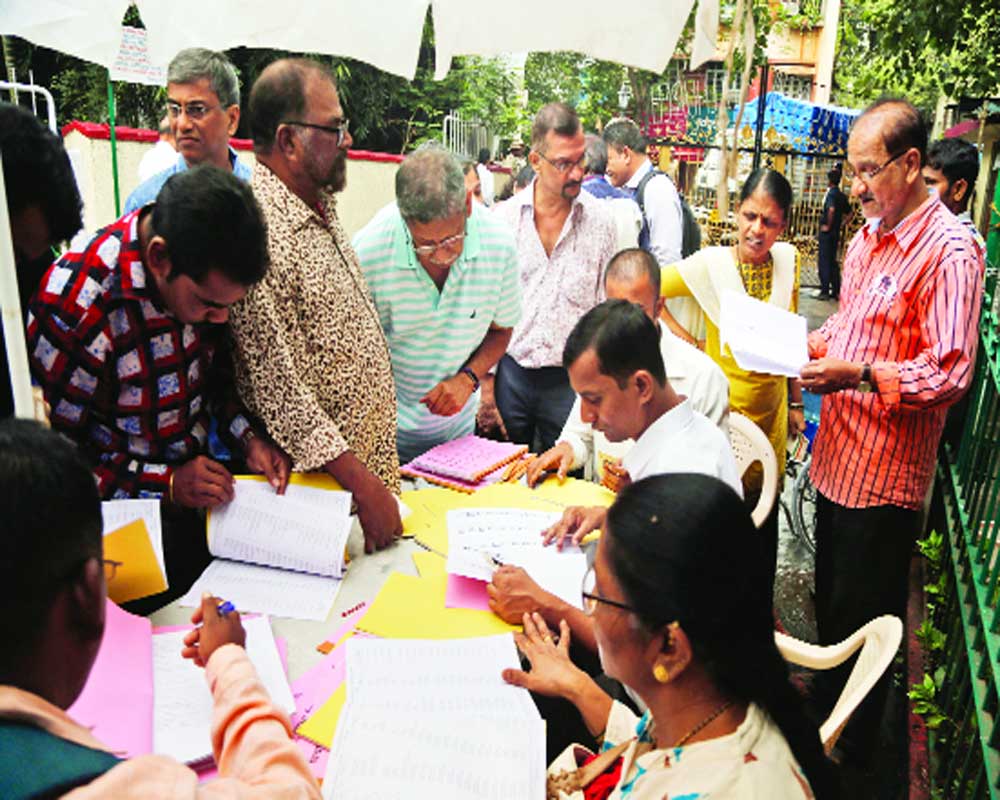Amid predictions of a cakewalk for the BJP in Haryana and Maharashtra, low turnout signals disenchantment
A crucial aspect got swamped by exit poll results that predicted a thumping and roadrolling win for the ruling BJP in the Assembly elections in Haryana and Maharashtra. While hyperactive anchors across TV channels wondered about the margin of victories and whether the BJP would best its own record in the Assemblies so far, Haryana recorded the lowest turnout in 50 years and Maharashtra in 39. According to the Election Commission’s figures, 63.55 per cent turnout was recorded in Haryana, while only 56.65 per cent came out to vote in Maharashtra. The former has seen its lowest voter turnout in Assembly elections since 1968 whereas the latter’s figures are lowest since the 1980 election. Not only that, both percentages are significantly lower than the turnouts in the last round of State polls in 2014 and the Lok Sabha elections in May. This means that almost half the voters did not exercise their choice despite greater awareness and an increase in polling booths, either out of a sense of resignation or a deep distrust. This is surprising considering that behaviourally, the voter seems most invested in local self-governance issues and, therefore, is expected to turn out for the Assembly elections that are fought on local affairs rather than national ones. Clearly, there is fatigue at work. Now this can be interpreted in many ways. Could it be that there is an immediacy of contexts, the Lok Sabha results having bolstered the image of Prime Minister Narendra Modi with such an overarching appeal that any other State, where his party is in power, is assumed to be operating as a satellite? The voter probably believes that the continuity of the same regime at the Centre and States would automatically ensure a Central-level urgency to resolving local issues. Perhaps, this unitary rather than federal character of governance has bred complacence. Even though both Chief Ministers, Devendra Fadnavis in Maharashtra and Manohar Lal Khattar in Haryana, have managed to consolidate their positions and blend in, the former a non-Maratha and the latter an outsider, they, too, encountered a voter slide. Nagpur south-west, from where Fadnavis is contesting, recorded 49.25 per cent of votes, down from 56.44 per cent in 2014, while Khattar’s constituency Karnal recorded 49.3 per cent of voter turnout, down from 67.84 per cent.
Also, there is now legitimacy to a majoritarian discourse given the BJP’s big win in the Lok Sabha and a larger acceptance of the muscularity of the party in pushing the One India narrative. The collective decimation of the Opposition parties and the total annihilation of the only other nationalist party of consequence, the Congress, have meant that the common man has already accepted the “there can be no alternative” formula in States where the BJP is in command. In the light of this understanding and absence of a real contest, many voters may have just thought that the ballot process would anyway be a futile exercise. Particularly for those with divergent views, there is a sense of helplessness that their vote would be too minuscule to matter or that their dissent was unwanted. Tidal verdicts in succession have meant that very few seats in “friendly” States are considered “unsafe” for the BJP. Besides, at the State level, not even the ruling party is seen as following through with pledges to keep the voter animated as a decision-maker. Or it could be plain disgust at the thought that nobody would anyway give them a hearing. This ennui is dangerous to the extent that it undercuts the value of election in a democracy and actually veers it to a measure of a personality cult and a presidential style debate. This could also mean that the committed Opposition voters have dissipated somewhat and driven to as much irrelevance as the parties they feel echo their concerns. Particularly in Haryana and Maharashtra, the Congress failed even to get its basic act together with faction fights tearing it apart and turf leaders working at cross purposes. In Maharashtra, the party bled like never before with several key leaders deserting the ship. No wonder the monolithic predictability has dampened enthusiasm and though there is a younger demographic that’s perhaps gung-ho, the older registered voters are still a sizeable chunk of the pie. This is not new. Even in the UK, from where we have derived our parliamentary democracy, a large proportion of voters have shunned the “political elite.” Indeed, the Brexit vote has been viewed by many commentators as a vote of disillusionment. However, this only lulls the political class into an illusionary sense of popularity. The vote matters in ensuring checks and balances.


























